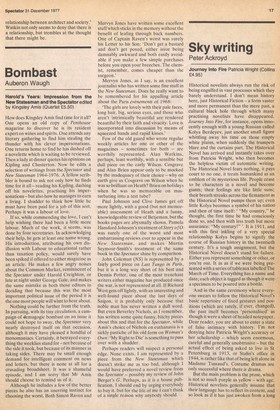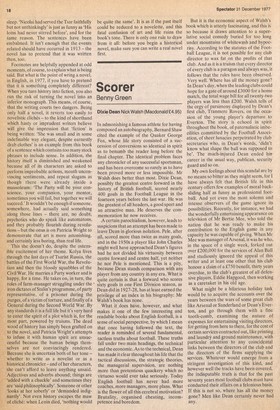Sky writing
Peter Ackroyd
Journey Into Fire Patricia Wright (Collins £4.95) Historical novelists always run the risk of being engulfed in vast processes which they barely understand. I don't mean history here, just Historical Fiction — a form vaster and more permanent than the mere past, a cultural black hole through which many practising novelists have disappeared. Journey Into Fire, for instance, opens innocently enough with a young Russian called Kolya Berdeyev, just another small figure whittling away his time on those empty white plains, when suddenly the trumpets blare and the curtains part. The Historical Novel has arrived and instantly takes over from Patricia Wright, who then becomes the helpless victim of automatic writing. The Historical Novel fears nothing, it pays court to no one, it treats humankind as an emblem of its mysterious life. People cease to be characters in a novel and become giants; their feelings are like little suns; their breath streaks across the firmament as the Historical Novel pumps them up; even little Kolya becomes a symbol of his nation and then of time itself: "My country," he thought, the first time he had consciously done so, and then with less truth but more assurance: "My century!" '. It is 1911, and with this first inkling of a very special relationship Kolya begins to signify the course of Russian history in the twentieth century. It's a tough assignment, but the Historical Novel doesn't stand for failure. Either you represent something or other, or you're out. It as as if we were being presented with a series of tableaux labelled The March of Time. Everything has a name and date; each object is tagged as though it were a specimen to be poured into a bottle.
And in the same ceremony where everyone swears to follow the Historical Novel's basic repertoire of fixed gestures and positions (which are rarely, if ever, changed), the past itself becomes 'personalised' as though it were a sheet of headed notepaper. Dear reader, you are about to enter a state of false intimacy with history. I'm not denying here Patricia Wright's accuracy or her scholarship — which seem enormous, careful and generally unobtrusive — but the actual effect of being asked to live in St Petersburg in 1913, or Stalin's office in 1944, is rather like that of being left alone in Madame Tussaud's. Costume dramas are only successful where there is drama.
But the main problem is the prose, which is not so much purple as yellow — with age. Historical novelists generally assume that their language has to reflect its content, and so look as if it has just awoken from a long sleep. Nicolai had served the Tsar faithfully but not unthinkingly' is just as funny as 'His loins had never stirred before', and for the Same reason. The sentences have been embalmed. It isn't enough that the events related should have occurred in 1913 — the novel has to pretend that it was written then, too.
Footnotes are helpfully appended at odd moments, of course, to explain what is being said. But what is the point of wring a novel, in English, in 1977, if you have to pretend that it is something completely different? When you turn history into fiction, you also run the risk of turning the novel into an inferior monograph. This means, of course, that the writing courts two dangers. Being only half a novel, it reverts too easily to novelistic clichés — to the kind of shorthand which hasty or imprudent writers believe will give the impression that 'fiction' is being written: 'She was small and in some indefinable way elegant, despite earnestly drab clothes' is an example from this book of a sentence which contains too many stock phrases to include sense. In addition, the history itself is diminished and weakened because all of its characters are asked to perform improbable actions, mouth unconvincing sentiments, and repeat slogans as though there were already inside a mausoleum: The Party will be your conscience, your companion, your mentor, sometimes you will fail, but together we will succeed.' It wouldn't be enough if someone, somewhere, had actually said something along those lines — there are, no doubt, psychotics who do speak like automatons, and they probably flourish during revolutions —but the onus is on Patricia Wright to demonstrate that art is more astonishing, and certainly less boring, than real life.
This she doesn't do, despite the ostensible excitement of her theme. Kolya lives through the last days of Tsarist Russia, the battles of the First World War, the Revolution and then the bloody squabbles of the Civil War. He marries a Party worker and is happy, for a time. He takes on, in turn, the roles of farm-manager struggling under the iron dictates of Stalin's programme, of party representative, of a prisoner during the purges, of a victim of torture, and finally of a General during the Second World War. By any standards it is a full life but it's very hard to enter the spirit of a plot which is, for the most part, powered by truisms. The dead wood of history has simply been grafted on to the novel, and Patricia Wright's attempts to infuse it with human spirit are unsuccessful because the human beings themselves are not convincingly rendered. Because she is uncertain both of her tone — whether to write as a novelist or as a historical chronicler — and of her characters, she can't afford to leave anything unsaid. Adjectives and adverbs abound; things are 'added with a chuckle' and sometimes they are 'said philosophically'. Someone or other 'looks at her soberly' or 'demanded indignantly'. Not even history escapes the maw of cliché: when Lenin died, 'nothing would be quite the same'. It is as if the past itself could be reduced to a novelette, and this fatal confusion of art and life ruins the book's tone. There is only one rule to draw from it all: before you begin a historical novel, make sure you can write a real novel first.







































 Previous page
Previous page